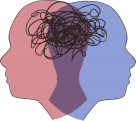Depression is a complex and multifaceted mental health condition that affects millions of individuals worldwide. While most people are familiar with the term "depression," it's important to recognise that there are various types of depression, each with its own unique characteristics. By gaining a deeper understanding of these different types, we can increase our knowledge and empathy towards those who may be struggling. In this article, we will explore some of the most common types of depression and shed light on their distinct features.
- Major Depressive Disorder (MDD): This is what most people commonly refer to as "clinical depression." MDD involves persistent feelings of sadness, hopelessness, and a loss of interest in activities that were once enjoyed. Individuals with MDD may experience changes in appetite, sleep patterns, and energy levels. This type of depression can significantly impact daily functioning and often requires professional intervention.
- Persistent Depressive Disorder (PDD): Formerly known as dysthymia, PDD is characterised by a long-lasting, chronic form of depression. Symptoms may be less severe compared to MDD, but they can persist for two years or longer. People with PDD often experience a consistently low mood, feelings of inadequacy, and a lack of interest in daily activities.
- Bipolar Disorder: Bipolar disorder involves extreme mood swings that alternate between periods of depression and periods of mania or hypomania. During the depressive phase, individuals may experience symptoms similar to those of MDD. However, during manic or hypomanic episodes, they may feel excessively euphoric, impulsive, and energised. This cycling between depression and mania distinguishes bipolar disorder from other types of depression.
- Seasonal Affective Disorder (SAD): SAD is a subtype of depression that occurs in a seasonal pattern, most commonly during the winter months when daylight is limited. Symptoms may include low mood, lack of energy, increased sleep, and weight gain. Light therapy and lifestyle adjustments are often used to manage SAD.
- Postpartum Depression (PPD): PPD is a specific type of depression that affects new mothers after childbirth. It is characterised by feelings of extreme sadness, anxiety, and exhaustion. Hormonal changes, lack of sleep, and the stress of caring for a newborn can contribute to PPD. Prompt intervention and support are crucial for the well-being of both the mother and the baby.
If you or someone you know is experiencing any form of depression, it's important to seek help. Psychotherapy can be an effective treatment option, providing a safe and supportive environment to explore underlying issues, develop coping strategies, and work towards recovery.
At Psychotherapy Surbiton, we specialise in helping individuals navigate the complexities of depression. We offer personalised treatment plans tailored to each individual's unique needs. Don't suffer in silence. Reach out today for the support and guidance you deserve.
Remember, depression is a treatable condition, and seeking professional help is a courageous step towards a brighter future. Together, we can work towards healing, growth, and reclaiming your life from the grips of depression.
If you or a person in your family is struggling with depression, please contact Psychotherapy Surbiton for more information or to book an appointment.
Sources:
- https://www.nimh.nih.gov/health/publications/depression/index.shtml
- https://www.psychiatry.org/patients-families/depression/what-is-depression
